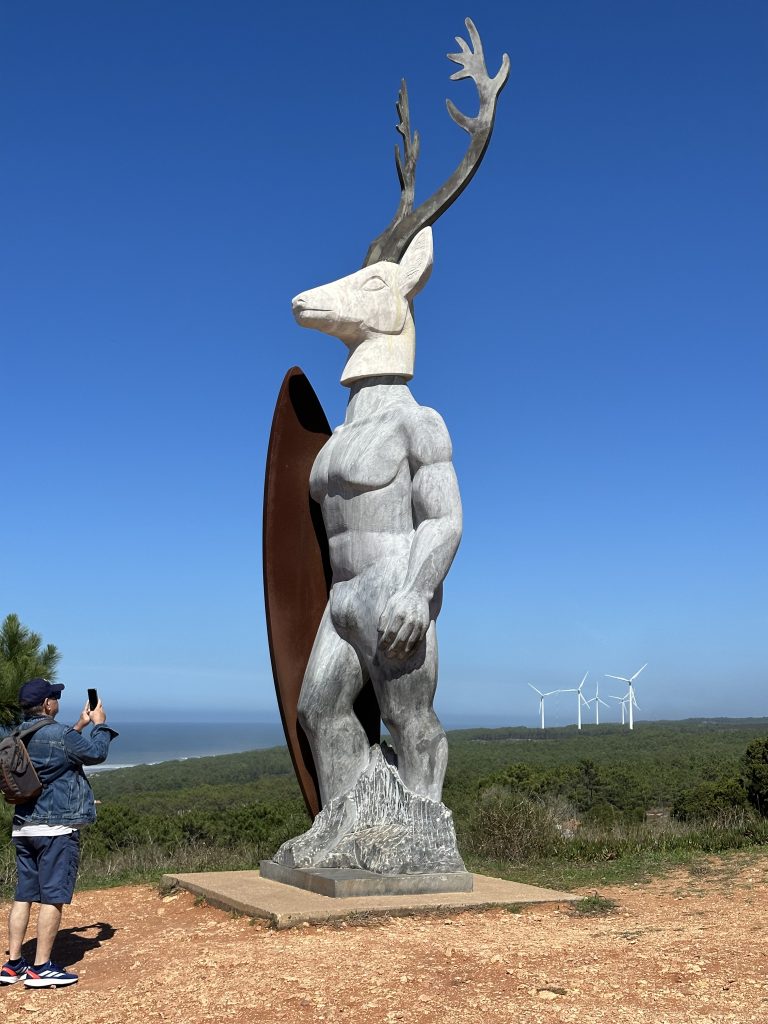
October 25, 2023 By Michael Weymouth
Nazare, Portugal is the home of the world’s largest waves. It owes much of its fame to Garrett McNamara, a surfing legend from Hawaii who was the first surfer who dared to ride the 100-foot monsters in the mid-2000s. Since then Nazare has been the Mecca for big wave riders from around the world, and for many tourists who flock there to view them from the safety of the castle point overlooking the gnarly waves. McNamara is a local hero there for having put Nazare on the must-see tourist map. The town even erected a monument to him.

Leading out to the castle is a long sea-eroded cliff exposing layer upon layer of the earth’s geological history, a virtual evolutionary time line.
We were sitting on a restaurant deck down at sea level admiring this view when we began talking with Luis, our guide, about how the enlightened people of the Renaissance could have looked past their fishing boats on the shore at that cliff and not seen the earth’s history revealed and how it conflicted with the earth-was-made-in-six-days story they had been conditioned to believe.
Our guide, Luis, explained that in fact, while a few leaders in the Middle Ages, mostly members of royalty and religious orders including the Templar Knights, were well-educated enough to understand the world around them, they made sure that the masses were intentionally kept ignorant in order to keep the masses under their control. They especially didn’t want the people asking existential questions that would challenge the existence of heaven and hell, which was the primary way they controlled the masses: good people go to heaven, bad people go to hell. Staring curiously at an eroded cliff with all the evolutionary stories it could tell was not part of the plan. To wit, Galileo, the father of modern science was shut away in prison by the authorities to prevent his “heretical” views from becoming public knowledge. The masses could not be trusted with knowledge. Knowledge was power. Thus the earth remained flat for centuries.
It was an early example of disinformation, or in this case, no information, for the sole purpose of controlling the way people thought, and of intentionally keeping them ignorant.
We explained to Luis that we continue to fight that battle in our own country, where much of the U.S. population can be made to believe things that are simply not true, and that they are intentionally fed disinformation in order to control the narrative that influences their lives. Moreover, those of us who do believe in science are considered elitists and that we are corrupted by knowledge, as if knowledge is a bad thing.
Luis was no stranger to American culture. He said the Portuguese watched incredulously, as the Covid pandemic overwhelmed our country and the battle over vaccines began. Meanwhile, Portugal had a 96 percent vaccination rate.
I explained that we were in a place where many Americans had been misinformed, which caused many people to lose faith in our government and institutions. Luis responded with a very interesting point. He said that most of people in Portugal had lived through the Salazar dictatorship, which came to an end in the 70s. They knew what it was like to live under authoritarian rule, so they cherished their new democracy much more as a result. He pointed out that their parliament was just as full of differing views as our Congress, but when it came time to collaborate for the good of the country, the Portuguese parliament always came together. I’m sure it wasn’t quite as simple as that, but even if there was just a grain of truth to what Luis was saying, Portugal’s legislature clearly outshines our dysfunctional Congress.
But what stuck with me most about Luis’ comments is how in his country they cherish their relatively young democracy, whereas in our country we seem to have lost that lovin’ feeling. Civic pride has succumbed to tribalism. Trust in our institutions is at an all-time low, fed in no small part by a constant stream of right-wing disinformation. As in medieval Portugal, the masses apparently cannot be trusted with knowledge. It’s as though for many Americans, the earth is still flat.


Too true, Mike. Portugal first won her independence from Spain, then became close with England during the Napoleonic years, and then experienced Salazar. Let’s hope Americans can skip the authoritarian experience and return to our true Revolutionary roots.